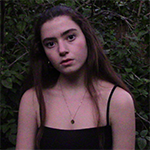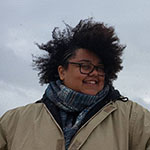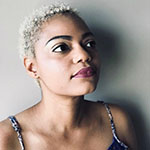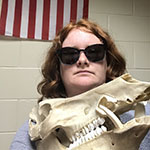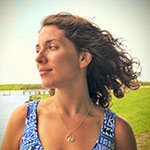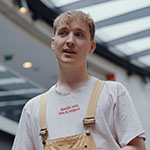Gossypium
I have a joke for you
What is the only plant that grows
When you feed it blood?
The cotton tree.
Did you laugh?
I’ve been thinking a lot about
ancestry lately,
as I’m stuck still in the trap
of an existential early 20s.
I’ve been thinking about who I would have been
on the continent,
if I should do like the diaspora—
pledge my allegiance to an idea of home
I’ll never be able to corroborate—
claim Ghana, or Nigeria or Cote de Ivoire
as the place before the chains
(my last name is French, after all.)
I took Anthropology in college
and my professor told the class that
Ancestry.com, really any DNA testing kit,
was full of shit,
and a door closed
and my heart broke
all over again.
There were two white people
at my family’s Christmas last year.
They were the only people who got
23andMe kits.
In the first creative writing class
I ever took, the teacher asked everyone
to go around the room,
answer what our names meant
what story they told
Givhan… where does that come from?
Slavery.
I’ve been thinking about the ancestors
as I write a book influenced
by myths from a country that colonized
a good chunk of the world,
ones I’m familiar with
because they were what got taught.
I think about them
when there’s an uptick on Black twitter
of posts saying shit like:
Buck up y’all, they’re dancing in the Kingdom, filled with joy at what you get to do
without them chains. Make their sacrifice worth it. Make them proud.
(or whatever fits in 120 characters.)
I took a class on African Religion
and almost holy disregarded the units
on Catholicism and Christianity,
preferring the flavor of the ATR tales,
like the one where a chicken
helps create the world:
Obatala climbs down a gold chain
and scatters sand from a snail shell.
He releases the bird to go bat shit—
wherever it kicks
a sandstorm of hills and valleys follows—
and the world began.
(I think I should stop eating chicken)
I like to think of the Orishas as my ancestors
when the flesh and blood reality
of historical violence
on bodies that look like mine
starts to consume me.
I think of Obatala and the black cat
brought to a creation myth—
whose only job was to curl up beside him,
keep him company in a new made world—
and I see a way of life
where I don’t have to be alone.
I think of Olokun livid as fuck,
drowning half the new made world
because a man was too stupid
to ask her permission
to enter and terra form her kingdom—
and I don’t feel the history
of Black women powerless,
raped and separated from their families.
I think of Shango and how fucking sick
a Black god of thunder must be—
Static Shock meets John Henry meets Jesus
(but obviously not white-washed Jesus)
and I feel strong knowing
he could beat the absolute shit
out of Zeus, if it came to it.
But then I think of the golden chain
Olorun allowed Obatala
to hang off the edge of the sky
in the first place—
find myself shackled
to the same kind of narrative.
So I’ve been thinking
about ancestry a lot,
but also about theft.
The continental kind.
The kind so huge it can’t be replaced by reparations
(though it’s a good fucking place to start)
The kind that has punched a hole
in the fabric of this history,
a loss so permanent it’s opened a pit in me
that no number of stories could ever fill.
An Homage Of My Father
I.
My mother told me once,
when I asked why I never knew
Alabama soil. Blackness. The richness
of my place on this earth
in this tree,
a story about walking with my father
and the truck that drove by
and the people inside who slowed down
to throw bricks at them.
I asked Did you throw them back,
teach them a lesson?
and her mouth said the no her eyes couldn’t,
busy as they were saying something
in a language I didn’t understand then,
horrors I couldn’t pronounce as a child
in a dialect unused to the flavor of lynching,
my white teeth in this black mouth
unable to let the knowledge of death
slip through its gaps.
II.
My father is as Black
as I like to imagine the soil
in that place we were taken from.
III.
The things I know about my father,
are that he used to go to movies with friends,
where one person would buy the ticket
and let the others in through the exit
that he learned how to drive using a friend’s car
because no one in our family owned one,
used to cheat at cards, palm them,
have one up his sleeve to rig the game,
that he walked 5 or more miles a day
to get to a bus that would take him
to a segregated school,
that he grew up using an outhouse,
no indoor plumbing,
and that his parents were sharecroppers,
his father died young.
I know my father has a bad back
from teaching soldiers
to jump out of helicopters,
that the VA hospital gives out cortisone shots
in the years it takes
between insurance claims and surgery,
that he joined the Air Force to get out
of a South so deep and dark,
he still won’t talk about it,
won’t acknowledge that some part of me
is curious what part of her
might belong down there
with the ones who never left.
I know my father had a brother
who died in a motorcycle accident
one who’s a trucker
one who calls occasionally,
another that totaled my father’s car
while he was deployed in Germany,
another that stopped on a highway in Seattle,
threw the car with my mother and my father and himself
into reverse, to take the exit he’d overshot
I know he still talks to Shirley
and one other sister, Ernestine, I think,
that another sister died
unknown.
I know he married a white woman,
had three brown daughters,
that he takes care of four cats
and puts money in my account
when I get scared I can’t afford
to be alive,
I know he didn’t tell my mother
about his family reunion
two summers ago,
that he was silent as she yelled at him
when I let it slip.
IV.
I know that some kid called him a nigger
at his job
and that if I could,
I would rip that fucker apart
tear the word out of his throat with my teeth
scratch our history into his body with my nails
and it still wouldn’t be enough
to keep it from happening again
to erase the trauma of all the other times
he’s been called something
I can’t protect him from.
V.
When I told my father
about getting kicked out of a class at OSU
to make a spot for the white students
who hadn’t gotten in and complained,
he said, Hang in there, kid
because he knows better than I ever will
that you can’t be Black in this country
without having some part of yourself
lynched—
VI.
My father is Black as the soil
I like to believe exists
in that place we were taken from
and he makes me cry
sometimes,
when I think of all the bad things
that could happen to him
for existing here.
VII.
My father is Black as new earth
in an old world we never got to know,
and I thank the god he still believes in
but I never could
that he is my father.
Juliette Givhan is a poet and MFA candidate at Oregon State University. She completed a BA in English with a minor in African American and African Studies at Michigan State University. Her writing explores popular culture, memes, myths, and the intersection of identities—all in an attempt to learn how to survive as a Black queer writer in America.
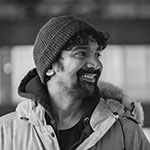

 BACK TO ISSUE
BACK TO ISSUE


